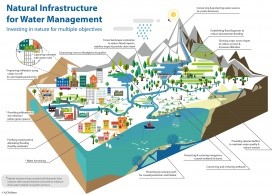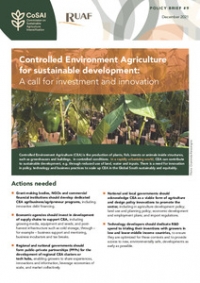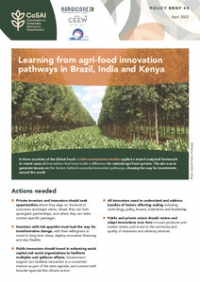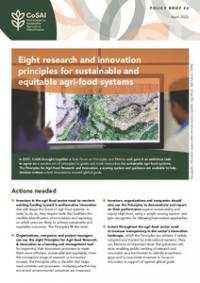This year the World Economic Forum identified “water” as the biggest societal and economic risk for the next 10 years – read that again – the biggest risk!
Climate change is affecting the water cycle. Water variability is increasing and extreme events (floods and droughts) are becoming more common and increasingly costly. In the face of climate change managing water resources is becoming more difficult. In many places the impacts of climate change will not only have huge human costs, but also major economic costs: increasing risk, reducing returns on investments and constraining economic opportunities.
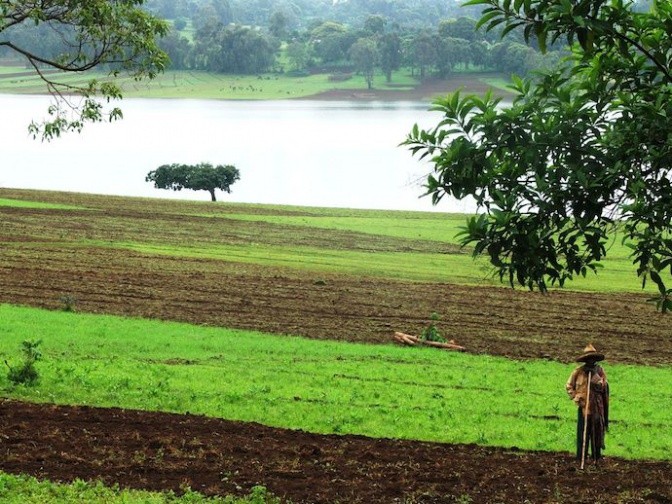 Farmers cultivate land next to a reservoir on the Meka River in Ethiopia. Photo: Matthew McCartney
Farmers cultivate land next to a reservoir on the Meka River in Ethiopia. Photo: Matthew McCartneyAgainst this background, there is a competing discourse on the need for more built infrastructure (e.g. dams, canals and levees) to store and regulate water in order to support social and economic development and facilitate adaptation to climate change.
The conventional perspective: build more
One perspective argues that the broad links between building water infrastructure and economic development are well established and what is needed is more of the same. The argument put forward, is that socio-economic development is curtailed in countries that have insufficient built infrastructure to manage water and many developing countries are “held hostage to their hydrology”.
This situation will only get worse as populations rise and climate change bites. Therefore significantly more investment is needed to build infrastructure (at the global scale up to US$10 trillion over the next two decades) to increase water security.
An alternative perspective: “Nature-based” solutions
In recent years, an alternative perspective has been advocated, primarily because of the adverse environmental and social impacts associated with large-scale infrastructure. In this case, the argument offered is that a re-design of conventional approaches is needed; one that works with rather than against natural systems.
The case made is that socio-economic development can be achieved in many ways and some alternatives are more sustainable and more equitable than others. In the context of water, solutions that support, rather than undermine, the environment are advanced as a prerequisite for sustainability.
It is argued that so called, “nature-based” solutions (see image on right) provide alternatives to built infrastructure, that can be more cost-effective and provide many co-benefits – benefits that are often forgotten when water management becomes too narrowly defined and implemented.
Building a balance
Both approaches attempt to balance social, economic and environmental considerations. Yet, in emphasizing different tensions that exist between these three elements, the two communities-of-practice, advocate different approaches: one placing emphasis on built infrastructure, and the other on natural infrastructure.
The reality is that a more nuanced approach is needed. One that recognizes that, without doubt, more built infrastructure is required but that in any given situation built infrastructure is not necessarily the best option. Alternative solutions should be given equal consideration in planning.
Furthermore, when construction of built infrastructure, does take place it should be built in balance with nature: recognizing that infrastructure performance is dependent not just on management practice and operational rules but also, very importantly, ecosystem services. Clear and concerted efforts are needed to minimize adverse environmental impacts, allowing ecosystems and infrastructure to work in tandem.
If river basins themselves are treated as natural infrastructure, based on the ecosystems services they provide (e.g. water storage and filtration), then infrastructure planning and investment can consider different ‘portfolios’ of built and natural infrastructure. It is proposed that such an approach is more likely to achieve outcomes for the multiple goals of poverty reduction, water-food-energy security, biodiversity conservation and climate resilience – outcomes that are more equitable, effective and economically viable.
Integrating society and ecology
A major limitation of this approach is that evaluating options and finding an appropriate balance between development needs and safeguarding ecosystem services is far from straightforward. Current planning and decision-making processes tend to isolate water management issues within the context of engineering or hydrology and give insufficient consideration to ecosystem services. What is needed is knowledge and tools that promote much greater integration of social and ecological thinking into planning processes.
Such an approach is being attempted in the WISE-UP to Climate project. The International Water Management Institute (IWMI), and the International Union for Conservation of Nature (IUCN), together with WISE-UP partners the Basque Centre for Climate Change, ACCESS in Nairobi, CSIR in Accra, ODI, and the University of Manchester are focusing on knowledge and tools that more directly and clearly link ecosystem services provided by natural infrastructure to the planning of built infrastructure.
WISE-UP is designed to integrate multidisciplinary research in the Volta and Tana River Basins, in Africa. In each case, this includes an analysis of the context in which decisions on investments in built water infrastructure are made, so that evidence and tools can be targeted at the institutions and stakeholders that are most amenable to change and able to influence alternative modes of thinking.
This coupling of infrastructure with nature highlights two main things:
First, ecosystem services and biodiversity concerns are a development challenge, and no longer just a conservation issue. If we are to achieve balanced development for all, challenging conversations need to take place.
Second, a much better evidence base is required that integrates disciplinary knowledge. This is a prerequisite for identifying the correct scale, sequence, operating rules, and complementary investments required to support natural and built infrastructure solutions for water management, as well as the many co-benefits for society at large.
WISE-UP is funded by the International Climate Initiative of the German Federal Ministry for the Environment, Nature Conservation, Building and Nuclear Safety.




